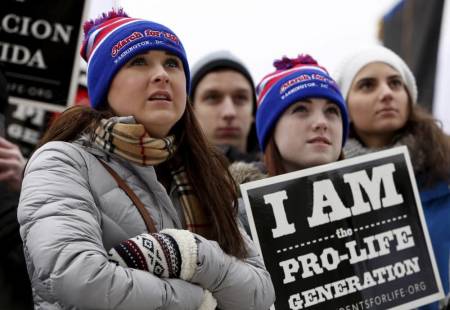Trump Won: What's Next for the Pro-Life Movement?

The future of the pro-life movement hung in the air during the 2016 election. While the election of Hillary Clinton could have spelled disaster for pro-lifers, Donald Trump's win might have been the saving grace of the pro-life movement.
Although Trump campaigned on promises to strip Planned Parenthood of its federal funding, appoint pro-life justices and support bills that protect the lives of unborn children, the question remains whether or not pro-lifers can realistically expect a GOP-led Congress and President-elect Trump to actually follow through and enact measures that pro-life conservatives have long called for.
The Christian Post interviewed pro-life leaders and the chair of the House Pro-Life Caucus, Rep. Chris Smith, R-N.J., to get a feel for what pro-life measures and initiatives actually have a chance of being signed into law in the next legislative session and what pro-life measures don't have a realistic shot of passing into law.
Defunding Planned Parenthood and repealing Obamacare
The consensus among the pro-life leaders who spoke with CP is that the one pro-life measure that has the best chance of being passed by both the House and Senate and signed into law by President-elect Trump in the next session is a bill that would repeal a number of major components of the Affordable Care Act and would also strip the nation's largest abortion provider of the majority of its federal funding.
As Planned Parenthood receives over $500 million in annual federal funding, both the House and Senate passed a bill earlier this year that would have stripped Planned Parenthood of most of its federal funding and would have repealed most of Obamacare and subsidies for health plans covering abortion.
However, Obama vetoed that bill in January.
Looking to the next session, Republicans will only have a 52-48 majority in the Senate, which will make it difficult to pass legislation that requires a 60-vote majority in the Senate.
However, Smith told CP that conservative lawmakers plan to again use the budget reconciliation process to make it so that a 51-vote majority is all that it would take to pass the legislation through the Senate and send it to the president's desk.
"The thought there would be that since we only need a 50-plus-one vote, a simple majority in the House and Senate to pass it, we will be able to repeal Obamacare and the majority of subsidy to Planned Parenthood," Smith said, adding that Planned Parenthood has killed over seven million unborn babies. "Not all of [Planned Parenthood's funding] fits under reconciliation rubric but certainly Medicaid does and that is where [Planned Parenthood] gets 80 percent of their money and take them out of government subsidy."
"We did it last Congress. We sent it down to the president and he vetoed it," Smith added. "So, it's been through the traps in terms of parliamentarians. We have precedent. I am very optimistic that we can accomplish that."
Smith said that he is confident that President-elect Trump would sign such a bill into law, as Trump has expressed a willingness in the past to de-fund Planned Parenthood "as long as they continue to perform abortions."
Permanent ban against taxpayer funding of abortion
For decades, the Hyde Amendment, which prohibits federal funds from being used to pay for abortions, has been attached as a rider to appropriations bills. But pro-lifers are looking to make the Hyde Amendment permanent legislation so that if Republicans lose control of the House and Senate, the amendment will be harder for Democrats to strike down.
Smith introduced the "No Taxpayer Funding for Abortion Act," in the House last year.
Such legislation, should it be re-introduced in the next session, will have a harder time passing through the Senate than the measure defunding Planned Parenthood since it would need a 60-vote majority.
"We will get a permanent Hyde Amendment through the House of Representatives. They voted on that in this current session," Carol Tobias, the president of the National Right to Life Committee, told CP. "I will fully expect that they will do that again, possibly early next year. The problem will again be the Senate. Right now, because of the filibuster, you need 60 votes to actually get something through if the Democrats would decide to fight it."
"I will certainly expect [Senate Democrats] to do it again," she continued. "Democrats have decided that abortion is their top priority, or at least one of them, and they will do everything they can to defend and protect the procedure. They are certainly in cahoots with the abortion industry to try and stop any regulations. It will be a battle in the Senate."






















